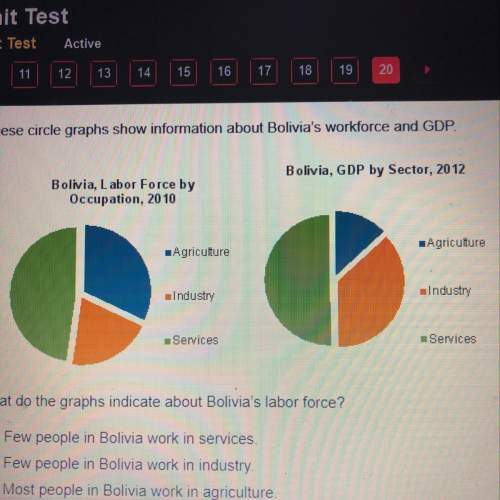
History, 19.11.2019 07:31 Kcmayo6019
1) which was not one of the major causes of the cold war?
a: soviets constructed the berlin wall.
b: soviets feared western promotion of capitalism.
c: westerners feared soviet world domination.
2) which of the following would be an unlikely element in a policy of containment?
a: offers of military aids that become allies.
b: boycotts and embargoes against unaligned nations.
c: economic aid to countries destroyed by way.
3) who would be most likely to agree with the following statement?
- we must carefully observe and analyze the actions of the soviet union to prevent it from spreading communism.
a: douglas macarthur
b: emperor hirohito
c: george kennan
4) who would be most likely to agree with the following statement?
- a revolution is no picnic. we must eliminate capital and imperialism even if thousands have to sacrifice their lives.
a: mao zedong
b: george marshall
c: john f. kennedy
5) who would be most likely to agree with the following statement?
- our policy is designed to the poor, hungry people of europe who are struggling with the chaos and devastation caused by world war ii so free institutions can flourish again.
a: meozedong
b: george marshall
c: emperor hirohito
6) who would be most likely to agree with the following statement?
- people everywhere who are interested in civil rights support the people of berlin.
a: harry truman
b: adolf hitler
c: john f. kennedy
7) who would be most likely to agree with the following statement?
- capitalist systems will eventually crumble on their own because they are corrupt and unfair. people will naturally turn toward communism.
a: george marshall
b: nikita khrushchev
c: douglas macarthur
8) japan become a peaceful, democratic nation relatively quickly after the end of world war ii. which step was not part of its post-war transformation?
a: adopting a new constitution.
b: disarming most of the military.
c: giving the emperor more political power.
9) what was the great leap forward?
a: mao's plan to transform china into a modern, industrialized nation.
b: stalin's plan to industrialize the soviet union.
c: secretary of the state marshall's effort to rebuild europe after world war ii.
10) why did mao start the cultural revolution?
a: he wanted to speed up and eliminate western, capitalist influence.
b: he wanted to speed up the economy by promoting capitalism.
c: he thought government officials had promoted a very narrow view of communism.
11) what launched the korean war?
a: south koreans tried to capture the government in p'yongyang.
b: north koreans, with stalin's approval, invaded south korea.
c: general macarthur led an invasion of north korea.
12) japan's political transformation after world war ii took that country from
a: empire to parliamentary democracy.
b: empire to communism.
c: representative democracy to communism.
13) the goal of the north korean leaders in 1953 was to
a: divide korea into two distinct nations.
b: unit north and south korea under the chinese government.
c: unit north and south korea under a communist government.
14) what event marked the beginning of the cuban missile crisis?
a: soviet spy planes photographed u. s. nuclear missiles being built in cuba.
b: u. s. spy planes photographed soviet nuclear missiles in cuba.
c: the united states refused to remove its nuclear missiles from cuba.

Answers: 3


Another question on History

History, 21.06.2019 22:50
European imperialism in the 19th century was largely motivated by a desire to: o a. assert power over other parts of the world. b. end the racist policies practiced in many foreign countries. o c. defend europe from aggressive foreign armies. d. relocate ethnic and religious minorities within national borders.
Answers: 3

History, 22.06.2019 02:30
Cuneiform was invented in which religion? mesoamerica egypt indus mesopotamia
Answers: 2


History, 22.06.2019 04:30
How did the united states’ approach regarding the japanese economy shift during the korean war? it focused on growth rather than reform. it focused on reform rather than growth. it focused on reform rather than stabilization. it focused on stabilization rather than decline.
Answers: 1
You know the right answer?
1) which was not one of the major causes of the cold war?
a: soviets constructed the b...
a: soviets constructed the b...
Questions

Biology, 20.11.2020 03:30

History, 20.11.2020 03:30


English, 20.11.2020 03:30

Physics, 20.11.2020 03:30

History, 20.11.2020 03:30

Chemistry, 20.11.2020 03:30




Mathematics, 20.11.2020 03:30

Mathematics, 20.11.2020 03:30

Mathematics, 20.11.2020 03:30

SAT, 20.11.2020 03:30



Mathematics, 20.11.2020 03:30

History, 20.11.2020 03:30

Arts, 20.11.2020 03:30

Arts, 20.11.2020 03:30




